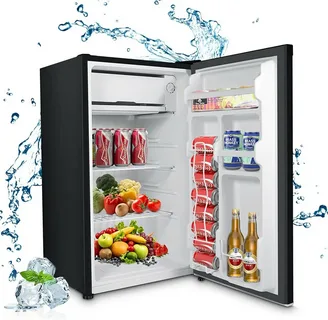When it comes to outfitting your kitchen, office, or dorm room, choosing the right refrigerator is a critical decision. The debate between a compact refrigerator and a full-size fridge depends on various factors, including your space, storage needs, budget, and lifestyle. In this guide, we’ll help you weigh the pros and cons of both options so you can make an informed choice.
Understanding the Basics
Before diving into comparisons, it’s essential to understand what differentiates a compact refrigerator from a full-size fridge.
- Compact Refrigerator: Typically smaller (1.7 to 4.5 cubic feet), designed for limited spaces like dorm rooms, offices, or bedrooms.
- Full-Size Fridge: Ranges from 18 to 26 cubic feet and is ideal for families or individuals with greater storage needs.
Space and Size Considerations
One of the most obvious differences is size. If you’re living in a small apartment or need an extra fridge for your home office or garage, a compact refrigerator may be the better option. It fits in tight spaces and consumes less energy.
On the other hand, if you have a large household or love cooking in bulk, a full-size fridge offers the space you need for fresh produce, beverages, leftovers, and more.
Ideal Uses:
- Compact Refrigerator: Dorm rooms, bedrooms, studio apartments, office spaces.
- Full-Size Fridge: Family homes, shared apartments, gourmet kitchens.
Storage and Functionality
In the debate of Compact Refrigerator vs. Full-Size Fridge: Which Should You Choose?, storage capacity is a crucial factor. A compact fridge may include only a small freezer section or none at all, which limits food preservation options. Some models may also lack adjustable shelving or dedicated compartments.
In contrast, full-size fridges come with multiple shelves, crispers, door bins, and often advanced features like water dispensers, smart controls, and ice makers.
Energy Efficiency and Cost
Compact refrigerators usually consume less electricity simply because they are smaller. However, full-size refrigerators have become increasingly energy-efficient thanks to modern technology.
In terms of upfront cost:
- Compact refrigerators: Generally cheaper ($100–$300)
- Full-size fridges: More expensive ($500–$2,000+)
Yet, if your needs grow over time, a compact fridge may end up being less cost-effective in the long run.
Final Verdict: Compact Refrigerator vs. Full-Size Fridge — Which Should You Choose?
The answer largely depends on your specific situation. If space is at a premium and your refrigeration needs are minimal, a compact refrigerator is the way to go. However, if you’re looking for long-term food storage, convenience, and more advanced features, a full-size fridge is the better investment.
In the end, when deciding between a compact refrigerator vs. full-size fridge, consider how much food you store regularly, the space available, and your budget. Both appliances have their strengths, and the right one for you will depend on how you plan to use it.


